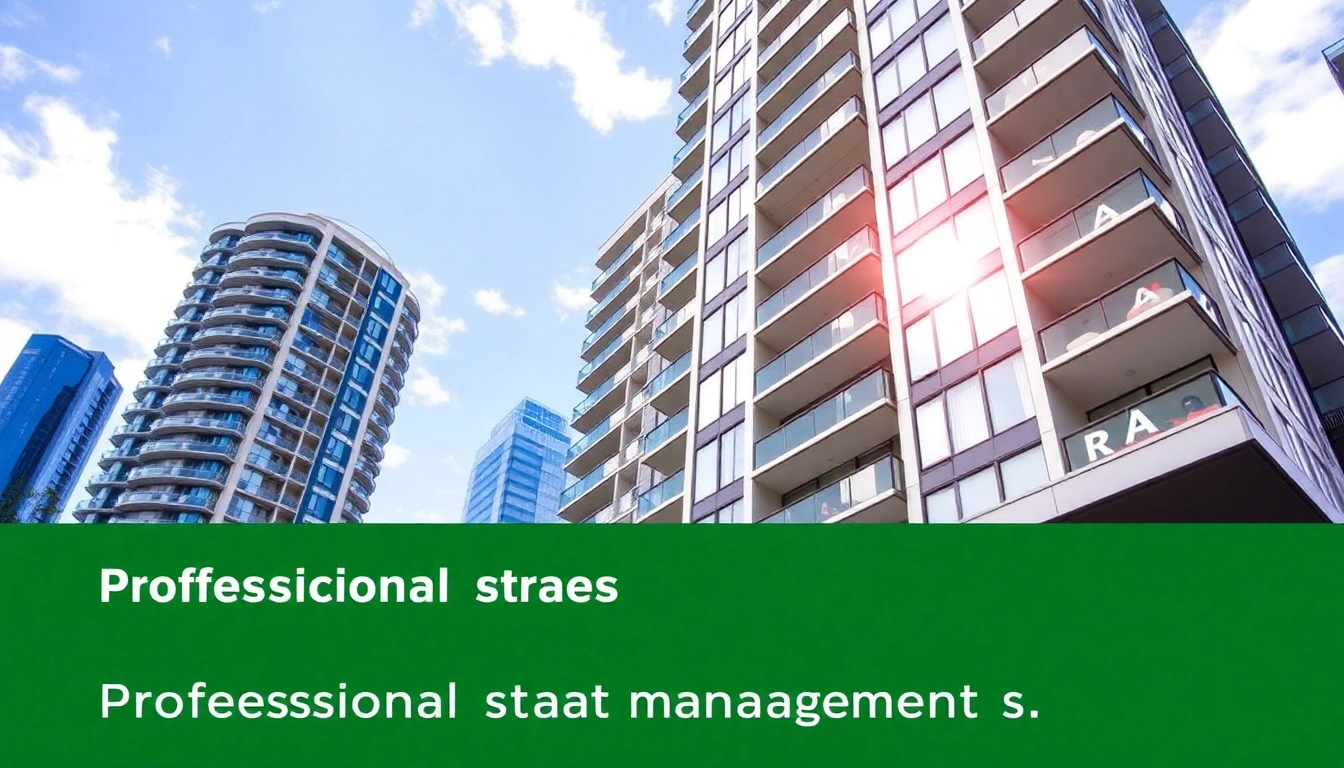Understanding the Fundamentals of Strata Management in Vancouver
What is Strata Management and Why It Matters
Strata management, often referred to as “body corporate management,” is a specialized sector within property management that oversees the operation, maintenance, and administration of strata-titled properties. These properties are typically complex arrangements comprising multiple owners sharing common areas, such as hallways, landscaping, amenities, and structural elements. Effective strata management ensures that these shared spaces are well-maintained, operating in compliance with legal frameworks, and fostering harmonious community living. It is an essential service that directly impacts property values, residents’ quality of life, and overall community stability. In Vancouver, where high-density living is prevalent due to limited land and rising real estate demands, professional strata management is indispensable.
For a comprehensive understanding of these services, visit Strata management and explore how professionals optimize community living.
Legal Framework and Regulatory Requirements in BC
In British Columbia, strata management operates within a well-defined legal framework primarily governed by the Strata Property Act (SPA), enacted in 2000. This legislation establishes the rights and responsibilities of strata corporations, owners, and managers, setting standards for financial management, maintenance, dispute resolution, and governance structures. Licensed strata managers must adhere to provincial licensing requirements maintained by the British Columbia Financial Services Authority (BCFSA), ensuring professionalism and accountability within the industry.
The legislation emphasizes transparency, legal compliance, and proactive management, including strict rules on financial reporting, reserve fund contributions, and dispute resolution processes. Managers are also responsible for legal disclosures, adherence to bylaws, and facilitating effective decision-making during meetings. Understanding these regulations is fundamental for all stakeholders to avoid legal pitfalls and maintain a compliant, efficient community.
Benefits of Professional Strata Management for Small and Large Communities
Regardless of community size, professional strata management brings tangible benefits, including enhanced property value, legal compliance, and community cohesion. For small strata corporations, dedicated management ensures that limited resources are maximized, and community concerns are promptly addressed—transforming what might seem like administrative burdens into seamless operations. Larger communities benefit from economies of scale, sophisticated maintenance planning, and comprehensive governance.
Specifically, professional management provides:
- Expert Financial Oversight: Budgeting, dues collection, and reserve fund management ensuring fiscal responsibility.
- Compliance and Legal Assurance: Navigating complex legislation to prevent disputes and penalties.
- Maintenance and Asset Management: Proactive upkeep of shared facilities increases longevity and reduces costly repairs.
- Community Engagement and Conflict Resolution: Facilitating communication, resolving disputes, and fostering a harmonious living environment.
Empirical studies indicate that well-managed strata communities maintain or increase property value over time, demonstrating the strategic value of outsourcing management to seasoned professionals.
Implementing Effective Strata Management Strategies
Key Responsibilities of Strata Managers in Vancouver
Strata managers serve as the operational backbone of community management, with responsibilities including administrative functions, financial oversight, legal compliance, and community relations. They coordinate statutory meetings, prepare agendas, and ensure accurate record-keeping, enabling strata councils to make informed decisions. Financial duties encompass budgeting, levies, accounting, and auditing, with strict adherence to the Financial Management Practices outlined by BC regulations.
Beyond administration, managers handle contract negotiations with vendors, oversee maintenance schedules, and ensure safety compliance across all facilities. Their role also involves conflict mediation, policy enforcement, and providing strategic advice to councils. Properly executing these responsibilities ensures the community runs smoothly, and property owners feel valued and heard.
Best Practices for Maintaining Common Areas and Financials
To optimize property value and resident satisfaction, implementation of best practices is vital. This involves scheduled, preventive maintenance, regular inspections, and clear documentation of repairs. Embracing technology—such as property management software—facilitates real-time tracking of maintenance requests and financial reporting, promoting transparency and efficiency.
Financial management should focus on proactive budgeting, maintaining comprehensive reserve funds, and transparent levy collection. Conducting annual audits and providing clear financial statements at meetings reinforce trust among owners. Engaging residents through communication portals and feedback channels also fosters long-term community stability.
Leveraging Technology for Efficient Strata Operations
Digital platforms revolutionize strata management by offering streamlined solutions for communication, document storage, financial transactions, and maintenance requests. Cloud-based management tools enable managers and councils to access critical data remotely, improve transparency, and facilitate faster decision-making. For instance, online portals allow residents to view documents, pay levies, and submit maintenance requests conveniently.
Incorporating smart building technologies, such as energy-efficient systems and security monitoring, not only reduces operational costs but also aligns with sustainable practices. As digital tools continue evolving, adopting innovative solutions becomes a strategic priority for Vancouver strata communities seeking enhanced efficiency and resident engagement.
Common Challenges and Solutions in Strata Management
Handling Disputes and Fostering Community Harmony
Disputes between owners, tenants, or management often stem from communication gaps, unclear bylaws, or conflicting interests. Addressing these issues promptly with mediation strategies and clear policies is essential. Regular community meetings and transparent communication foster mutual understanding and trust. Implementing conflict resolution programs, including professional mediators, can prevent disputes from escalating.
Case studies from Vancouver indicate that communities prioritizing proactive engagement and inclusivity report higher resident satisfaction and lower legal conflicts.
Managing Compliance and Legal Risks
Non-compliance with legislation or bylaws can lead to legal penalties, financial losses, and reputational damage. Strategies include continuous staff education, regular legal audits, and staying updated with regulatory changes announced by BC authorities. Maintaining organized records and adhering to statutory requirements safeguards the community against legal risks.
Engaging legal experts or licensed strata professionals ensures that policies align with evolving legislation and best practices, preventing disputes and ensuring smooth operations.
Maintaining Property Value through Proactive Management
Long-term property appreciation depends on proactive maintenance, financial planning, and community engagement. Regular inspections, timely repairs, and sustainable upgrades enhance asset longevity. Strategic planning of reserve funds ensures funds are available for major replacements, avoiding special levies and maintaining community stability.
Data analytics and benchmarking against industry standards help managers identify areas for improvement, optimize spending, and sustain or increase property values in Vancouver’s competitive real estate market.
Choosing the Right Strata Management Partner in Vancouver
What to Look for in a Strata Management Company
Selecting a proficient strata management partner involves evaluating their industry experience, licensing status, tailored services, and community feedback. A reputable company should demonstrate expertise in compliance, financial management, and community engagement, with local knowledge of Vancouver’s unique real estate market.
Key indicators include transparent pricing structures, technology integration, and proactive communication strategies. Certifications such as licensure by BCFSA underscore professionalism. Analyzing case studies or client testimonials provides insights into their track record of success.
Questions to Ask Before Contracting a Service Provider
Critical questions include:
- What services are included in your management packages?
- How do you handle maintenance, emergencies, and legal compliance?
- What reporting and communication channels do you provide?
- Can you provide references from similar communities?
- How do you leverage technology to streamline operations?
These queries help ensure strategic alignment and set expectations for service quality and responsiveness.
Case Studies of Successful Strata Management in Vancouver
Many Vancouver communities have benefited from expert management. For example, a downtown high-rise experienced a 15% increase in property value following comprehensive maintenance and transparent financial reporting led by a professional strata firm. Another small community streamlined its governance through digital portals, reducing administrative costs by 20%. Such successes underscore the importance of selecting experienced, community-focused partners.
Future Trends and Innovations in Strata Management
Integrating Sustainable Practices and Green Technologies
Sustainability is becoming central to strata management. Green technologies like energy-efficient lighting, solar panels, and smart HVAC systems reduce operational costs and environmental impact. Incorporating eco-friendly building materials and waste reduction programs aligns with Vancouver’s commitments to green living. Transitioning to sustainable practices not only enhances community appeal but also increases property value.
Forward-thinking management firms actively promote and implement these initiatives, often supported by government incentives and grants.
The Role of Digital Platforms in Streamlining Management
Digital platforms are transforming strata management by facilitating online communication, document access, payments, and maintenance tracking. Platforms like cloud-based management systems enable real-time updates, ensuring transparency and swift responses. These systems also foster resident participation in decision-making and community activities, enhancing cohesion.
As data security and user experience improve, digital solutions will become the standard, empowering communities to operate more efficiently.
Preparedness for Market Changes and Regulatory Updates
Market fluctuations, legislative reforms, and technological advances necessitate adaptable management approaches. Strata managers increasingly employ data analytics, predictive maintenance, and scenario planning to proactively address potential issues. Staying abreast of regulatory changes—from new building standards to environmental legislation—ensures compliance and strategic resilience.
Partners like Metrowest Building Services lead the industry by integrating these innovations, helping Vancouver communities thrive amidst evolving trends.













